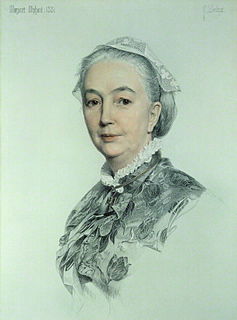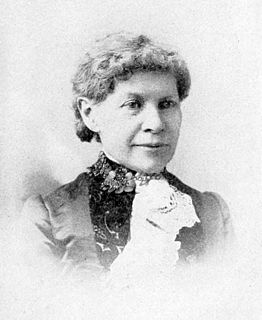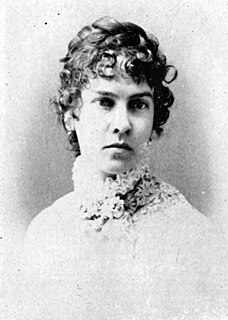Genie M. Smith (pen names, Maude Meredith and Kit Clover; born November 17, 1852) was an American author and publisher.
Genie M. Smith (pen names, Maude Meredith and Kit Clover; born November 17, 1852) was an American author and publisher.
Genie M. Boyce was born on a farm in Vermont, on November 17, 1852. Her father was an invalid, and she was left to live an out-door life in childhood. [1]
Genie M. Smith was widely known by her pen-names, "Maude Meredith" and "Kit Clover". She was a prolific author of serials, poetry, short stories and papers on home subjects for women. "Maude Meredith" began her literary career in the columns of the Chicago Tribune in 1880. The following year she issued The Rivulet and Clover Blooms, a small volume of poems. In 1883 she wrote St. Julian's Daughter, a novel of Dubuque in pioneer days. [1]
In 1884, she edited and published the Mid-Continent, a magazine which died young. In 1886-87-88 she edited the Housekeeper and created for that periodical its extensive reputation. Among other periodicals to which she has contributed are the Independent, Literary' Life, Peterson's Magazine , Chicago Inter Ocean , the Current, St. Louis Magazine , Golden Days, Journalist, Godey's Lady's Book , the Writer, St. Paul Pioneer Press , Northwest Magazine, Home-Maker, Ladies' World, and Ladies' Home Companion . [1]
She published two novels, Winsome but Wicked (Chicago, 1892), and The Parson's Sin (Chicago, 1892) and had other novels in press, and also The Columbian Cook-Book. In 1886 she published Our Money-Makers, a practical poultry book. [1]
Genie M. Boyce married, at an early age, Colonel Dwight T. Smith (d. 1903), manager of the Consolidated Tank Line, and moved to Dubuque, Iowa. They had four children, two of whom died in infancy. Her daughter Georgia died in an accident in 1890: she was seated in a buggy in front of her father's office when a runaway attached to a lumber wagon came down Main street extension. Georgia jumped directly between the horses and died in the impact. [1] [2]

George Meredith was an English novelist and poet of the Victorian era. At first his focus was poetry, influenced by John Keats among others, but he gradually established a reputation as a novelist. The Ordeal of Richard Feverel (1859) briefly scandalized Victorian literary circles; of his later novels, the most enduring is The Egoist (1879), though in his lifetime his greatest success was Diana of the Crossways (1885). His novels were innovative in their attention to characters' psychology, and also took a close interest in social change. His style, in both poetry and prose, was noted for its syntactic complexity; Oscar Wilde likened it to "chaos illumined by brilliant flashes of lightning". He was an encourager of other novelists, as well as an influence on them: among those to benefit were Robert Louis Stevenson and George Gissing. He was nominated for the Nobel Prize in Literature seven times.

Margaret Oliphant Wilson Oliphant was a Scottish novelist and historical writer, who usually wrote as Mrs. Oliphant. Her fictional works encompass "domestic realism, the historical novel and tales of the supernatural".

Ann Sophia Stephens (1810–1886) was an American novelist and magazine editor. She was the author of dime novels and is credited as the progenitor of that genre.

Nora Perry was an American poet, newspaper correspondent, and writer of juvenile stories, and for some years, Boston correspondent of the Chicago Tribune. Her verse was collected in After the Ball (1875), Her Lover's Friend (1879), New Songs and Ballads (1886), Legends and Lyrics (1890). Her fiction, chiefly juvenile, included The Tragedy of the Unexpected (1880), stories; For a Woman (1885), a novel; A Book of Love Stories (1881); A Flock of Girls and their Friends (1887); The New Year's Call (1903); and many other volumes.

Martha Joanna Reade Nash Lamb was an American author, editor and historian.

Frances "Fanny" Whiteside Brough was a Paris-born British stage actress who came from a literary and dramatic family. She is remembered especially for her many comedy roles performed over a four decade-long career.
Adeline Sergeant was an English writer.
Maude Goodman (1853–1938) was a British painter.
Matilda Marian Pullan —also writing under the pen names Mrs. Pullan and Aiguillette— was a prolific and influential 19th century British writer on needlework who contributed columns to a wide selection of periodicals in the 1840s and 1850s. She was the author of numerous books on needlework, especially the decorative forms known as fancywork, and she wrote a comprehensive encyclopedia on the subject. She was also an extremely successful businesswoman who ran a needlework supply shop that expanded to become a mail order business. Towards the end of her life, she moved to America, where she opened a consulting business whose clients included the actor Laura Keene.

Mary Catherine Crowley was an American author of poems and novels. She was also an accomplished musician and linguist. Crowley began her literary work in 1877 as a contributor of poems and short stories to Wide Awake, St. Nicholas Magazine, Ladies' Home Journal, and The Pilot. In 1892, she went to Europe and on her return, lived for ten years in Detroit, where she was a collaborator on the Memorial History of the city. Crowley was a recognized authority on the early history of that city, and a leader in its bicentennial celebration in 1901, the pageant being founded on descriptions in her book A Daughter of New France.

Clara Louise Burnham was an American novelist. After the success of No Gentlemen (1881), other books followed, including A Sane Lunatic (1882), Dearly Bought (1884), Next Door (1886), Young Maids and Old (1888), The Mistress of Beech Knoll (1890), and Miss Bagg's Secretary (1892). The daughter of George Frederick Root, she wrote the text for several his most successful cantatas. The 1923 film, A Chapter in Her Life is based on Burnham's 1903 novel Jewel: A Chapter in Her Life. Born in Massachusetts, she died at the family home in Maine in 1927.

Ada Langworthy Collier was a 19th-century American author from Iowa. She wrote sketches, short stories, poems, and several novels. Collier is remembered for Lilith, The Legend of the First Woman (1885).
Margaret Thomson Janvier was an American poet and author of children's literature who published under the pseudonym Margaret Vandegrift.

Mary Canfield Ballard was an American poet and hymnwriter who often used the pen name Minnie C. Ballard.

Clara Hammond Lanza was an American novelist whose realist fiction often centered on troubled marriages. Several were praised for exhibiting realism and originality. She published her first work in 1884.

Jessie Fremont O'Donnell was a 19th-century American writer of poems, novels and magazine articles, as well as a lecturer. In December, 1887, her first book, Heart Lyrics appeared. Later books were Love Poems of Three Centuries, Three Centuries of English Love-Songs, A Soul from Pudge's Corners, and others, besides contributions to various U.S. periodicals. She also essayed successfully the short story in some well-told tales and faithful character studies.

Martha Pearson Smith was an American poet and musician. She made significant contributions in secular and sacred verse. One of her best songs was "Jennie and I", which was set to music by Prof. T. M. Towne. She was a champion of the cause of temperance and did much to advance the movement in Minnesota.

Maude Andrews Ohl was an American journalist, poet, and novelist. She was The Atlanta Constitution's first woman reporter.
Blanche Lucile Macdonell (1853-1924) was a Canadian author and folklorist, whose writing was described as 'full-blooded and instinct with Canadian life and thought.'